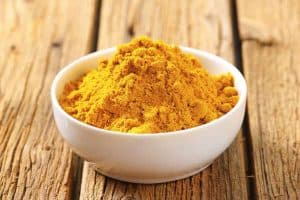Radiation therapy is a part of cancer treatment. Cancer cells are exposed to high energy rays in order to kill the cells and inhibit growth.
These rays mostly cause damage to the DNA and lead to cell death. Radiation therapy is generally given in combination with surgery or chemotherapy.
One of the drawbacks of radiation therapy is that these rays create reactive oxygen species which can damage normal cells and make cancer cells resistant to treatment.
Additionally the increased activity of DNA damage response system protects even cancer cells.
Table of Contents
- What is a radiosensitizer and how it helps?
- Turmeric as a Natural Radiosensitizer? What Research Says
- Curcumin increases response to radiation therapy in Head and neck cancer
- Curcumin arrests the growth of radio-treated Colon cancer cells
- Curcumin increases the efficacy of photodynamic therapy in Skin cancer
- Curcumin serves as a natural radiosensitizer in various cancer types
- Curcumin combines with other natural compounds as radiosensitizers
- How to take Turmeric for cancer?
- Precautions
- Conclusion
What is a radiosensitizer and how it helps?
 To counteract such resistance to radiation therapy, the need of external radiosensitizers arises.
To counteract such resistance to radiation therapy, the need of external radiosensitizers arises.
These agents are required to deliver toxic doses of radiation to cancer cells and at the same time minimize damage to normal cells.
Chemical radiosensitizers are already in use but a non toxic natural agent for the same function is preferred.
Curcumin is the most important constituent of herb and spice turmeric. Its anti-cancer activity is well documented.
Curcumin also possess radioprotective and radiosensitizinng properties. Radiation therapy induces reactive species which cause oxidative damage.
Curcumin offers radioprotection to normal cells from such damage and at the same time radiosensitizes cancer cells by reducing cell survival signals.
Ionizing radiation causes cellular damage via pathways that cause apoptosis (cell death) or by directly damaging DNA.
Additionally, it modifies genes relating to cell growth and development, interferes in cell signalling pathway and stimulates the activity of inflammatory chemicals which leads to radioresistance.
Curcumin not only acts as a radiosensitizer but also as a radioprotector during and after radiation therapy. Curcumin promotes radiosensitivity in multiple ways:
- It inhibits the activity of proteins TNF-alpha and NF-kappaB which control processes like inflammation and cell growth
- It inhibits the activity of enzymes like COX,LOX and prostaglandins which give rise to inflammation and radioresistance.
- It downregulates the activity of biological elements like Bcl-2 and cytochrome P450 which control cell cycle and drug resistance.
- It mediates cell death through different pathways such as activation of Bcl-xs,capsases etc.
- It arrests proliferation of cancer cell in different stages of cell cycle.
Turmeric as a Natural Radiosensitizer? What Research Says
Turmeric and especially curcumin’s ability to sensitize cancer cells towards radiation therapy has been studied in relation to a few types of cancer and that is what we will be covering in this section.
Curcumin increases response to radiation therapy in Head and neck cancer
Head and neck cancer (HNC) is cancer that occurs in the mouth, nasal cavity, sinuses and inside the throat. They are caused by alcohol, tobacco, exposure to certain toxins or even due to viruses like HPV. (Read: Turmeric for HPV)
Curcumin regulates the activity of antioxidant enzyme thioredoxin reductase in squamous carcinoma cell(cancer occurring in cells lining the oral and nasal cavity) and mediates radiosensitization.
This enzyme controls the response to radiation therapy. Further study showed that curcumin demonstrates this mechanism only in head and neck cancer cells that are free from HPV infection and not in those that are HPV infected.
Interestingly curcumin is found to be effective against HPV and cervical cancer.
Another mechanism by curcumin sensitizes oral squamous carcinoma cell to radiation is by inhibiting the activity of nuclear factor-kappaB, a protein that regulates many cellular processes including cell survival.
Curcumin sensitizes nasopharyngeal carcinoma cells (cancer occurring in cells in the upper region of throat) to radiation treatment in multiple ways.
What does this mean?
Curcumin radiosensitizes head and neck cancer cells by modulating antioxidant defences and influencing the activity of cell survival proteins.
Curcumin arrests the growth of radio-treated Colon cancer cells
Colon or colorectal cancer is cancer that affects the large intestine. Radiation therapy is used as preoperative treatment for rectal cancer.
A study was conducted wherein human colorectal cancer cells were exposed to radiation and were then treated with curcumin. Curcumin inhibited the proliferation of radiation treated cells.
Additionally, it reduced the activity of nuclear factor-kappaB and its gene products. This protein promotes the activity of genes that help in cell survival even under toxic conditions.
Another lab study also confirms this finding by demonstrating curcumin prevents development of tumor and formation of blood vessels in colon cancer cells.
Curcumin also radiosensitizes colon cancer cells by regulating the level of reactive oxygen species and antioxidant defences.
What does this mean?
Curcumin sensitizes colon cancer cells to radiation therapy by inhibiting the activity of a protein that is instrumental to cell survival, nuclear factor-kappaB.
Curcumin increases the efficacy of photodynamic therapy in Skin cancer
Skin cancer accounts for around 40% of the cancer cases worldwide. Curcumin is proven to reduce oxidative stress caused by UV rays and it also radiosensitizes cancer cells to photodynamic therapy.
These results suggest that curcumin and light together can be used in cancer treatment.
Other studies also state that curcumin as a topical application in combination with UV or visible light prevents the growth of tumors of skin cancer.
What does this mean?
Curcumin sensitizes skin cancer cells to photodynamic therapy and prevents tumor growth.
Curcumin serves as a natural radiosensitizer in various cancer types
Curcumin sensitizes a number of other types of cancer cells. Research shows that curcumin sensitizes cancer cells of different types of brain cancer to radiation therapy.
Rhabdomyosarcoma is a rare form of cancer that finds its origin in the muscle tissue. Curcumin radiosensitizes rhabdomyosarcoma cells by reducing the radiation-induced activity of nuclear factor-kappaB.
Ewing’s sarcoma is rare cancer that affects the bone. Curcumin sensitizes cancer cells of this type by regulating tumor-suppressing genes and promoting radiation-induced apoptosis (cell death).
Radioiodine therapy is used to treat or prevent thyroid cancer from spreading as thyroid gland takes up iodine and the radiation can destroy cancer. Study shows that curcumin increases radiosensitivity of thyroid cancer cells to radioiodine therapy and protects normal cells.
Curcumin is a potent radiosensitizer of cervical tumor cells and this is mediated by modulating levels of reactive oxygen species. Researchers state that applying curcumin systemically or topically can increase the effectiveness of radiation therapy in cervical cancer.
Curcumin is also proven to cause radiosenstivity in prostate cancer cell and Non-Hodgkin’s lymphoma.
What does this mean?
Curcumin is proven to radiosensitize cells of brain, thyroid, prostate and cervical cancer and also of some rare cancers.
Curcumin combines with other natural compounds as radiosensitizers
A study was conducted in Spain to investigate the radiosensitizing properties of curcumin and resveratrol. Their study revealed that both these components use multiple methods for radiosensitization such as inducing DNA damage or preventing drug detox.
One interesting mechanism used is that they monitor the cell growth cycle.
Cell cycle consists of different phases of growth. When non cycling cells were exposed to radiation, curcumin and resveratrol protected these cells from harmful effects of radiation.
However when cycles in growth phase were exposed to radiation, these compounds showed radiosensitizing effects. This means they protect normal cells and radiosensitize cancer cells.
A comparative study was conducted where the radiosensitizing properties of epigallocatechin-gallate (bioactive component of green tea), resveratrol (an important constituent of grapes) and Curcuma or turmeric was studied.
The cells used were of blood cancer. The cells were exposed to radiation and treated with each of these components.
All the 3 natural components were successful in reducing the proliferation of cancer cells and increased radiation-induced cell death. EGCG was the most potent one followed by resveratrol and Curcuma.
Curcumin, neem leaf extract, and raspberry extract are a few phytochemicals that show radiosensitizing properties.
What does this mean?
Other plant derived chemicals apart from curcumin that have been identified with radiosensitizing properties include resveratrol, epigallocatechin, neem leaf extract, raspberry extract etc.
How to take Turmeric for cancer?

It’s absolutely safe. 1.5-3g of cut root each day or 1-3g of the dried powdered root should help.
Taking black pepper with it can increase its bioavailability.
Some awesome ways to include turmeric in the diet include Golden Paste, Turmeric Milk and Turmeric Tea.
For better guidance on the dosage of turmeric for cancer treatment refer to Turmeric / Curcumin Dosage for Cancer : A Scientific Plan
Before taking turmeric supplements for cancer please discuss it with your doctor as its chemo and radiosensitizing action may cause your treatment regimen to be monitored closely.
Also, curcumin interferes with drug metabolizing enzymes. You can still include turmeric in a diet.
Precautions
Tumeric in food is absolutely safe. Even curcumin as supplements up to 8-12 g has proven to be safe. Mild gastric discomfort is possible when you start with turmeric supplements.
Avoid turmeric supplements during pregnancy and lactation. Avoid or limit turmeric intake as a spice if susceptible to kidney stones and gout.
Discontinue turmeric supplements 15 days prior to surgery to avoid the risk of bleeding.
Turmeric supplements can have drug interactions such as those taken to reduce stomach acid or blood glucose-lowering drugs.
Conclusion
Increasing resistance of cancer cells towards conventional treatment draws our attention towards alternative anti-cancer agents or agents that increase the efficacy of conventional treatment.
Curcumin plays multiple roles in cancer: anti-cancer agent, chemopreventive, chemosensitizer, radiosentizer, and chemo/radioprotector.
Additionally, it boosts the immune system and overall health.
Lab studies indicate that it has great potential as a radiosenstizer.
However, it is advisable to consult a health practitioner before taking turmeric supplements as it’s radiosensitizing action may cause your treatment regimen to be monitored strictly
Nevertheless, turmeric can still help to counteract the side effects of cancer treatment. (Read Turmeric: Natural Chemo/Radio Protector) So you have many reasons to include turmeric and curcumin in your daily regime as a preventive or curative measure.


Please address the issue of curcumin bio-availability when ingested orally. According to most sources, very little is absorbed. What is the absorbtion rate when taken with peperine?
Hi. Perhaps this might interest you:
https://www.turmericforhealth.com/general-info/how-to-improve-bioavailability-of-turmeric
Curcumin is poorly absorbed when taken orally. Adding piperine to it is said to increase its absorption by 2000% as per a study. But taking turmeric with black pepper and fats increases its absorption in the body.